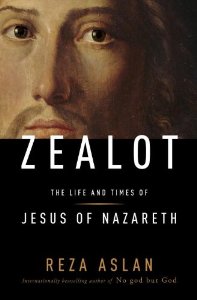Can a Muslim man help young Christian women find Jesus?
Like so many of us, acclaimed author Reza Aslan had that unforgettable, life-changing moment: a come to Jesus moment. At the age of 15, the Iranian-born Aslan, whose family fled the revolution and left religion behind, found Jesus in the blue skies of 1980s Northern California. He had a divine encounter with a savior that created, as it is wont to do, a passionate evangelist who shared the good news of Jesus Christ with everyone he met, even converting his mother to evangelical Christianity.
But also like so many of us, “something unexpected happened in my quest to save the souls of the world,” Aslan says in his new book, Zealot: The Life and Times of Jesus of Nazareth. “The more I probed the Bible to arm myself against the doubt of unbelievers, the more distance I discovered between the Jesus of the gospels and the Jesus of history — between Jesus the Christ and Jesus of Nazareth. In college, where I began my formal study of the history of religions, that initial discomfort soon ballooned into full-blown doubts of my own.”
The particular doubts of the typical young woman I hear from today come from that and myriad other discomforts: controlling, infantilizing encounters with all-male priests who mediate and dictate her communication with God; the dearth of women who are truly empowered in formal church leadership, leaving her no choice but to follow inauthentic male protocols; the lack of concern for real, modern, day-to-day female experience and vision in the Christian conversation; and, of course, the ad-naseum repetition of biblical stories and interpretive reflections that subtly guilt, silence and subjugate her.
For these reasons and more, Barna Group recently reported the “rise of the nones”: noting that of 18- to 29-year-olds with Christian backgrounds, 59% have dropped out of church attendance after having gone regularly, and half have been “significantly frustrated by their faith.” But spirituality is an important part of their lives, hence, the ‘spiritual but not religious’ tag. And the 2011 “State of the Church” study showed that specifically among women, there have been serious declines in church attendance, in Bible reading, and in the belief that the Bible is “accurate in the principles it teaches.” But yet despite all this, two-thirds of women say their “faith is still important to them.”

Which is why Zealot is mandatory reading for spiritually hungry young women (and men) who can no longer digest Christianity as it has been fed to them. Aslan deftly leads readers through a riveting biography of Jesus that pieces together the Gospel accounts along with broader historical sources to reveal how he actually would have understood himself and the purpose of his ministry within his true context: the violent, oppressive, apocalypse-obsessed, messiah-ridden, crucifix-crammed Roman occupation of first-century Palestine. But more uniquely, Aslan goes further to weave a compelling narrative explaining in detail how the life, ministry and stories of Jesus morphed so dramatically after his death. Jesus’ movement to return rulership of the Hebrew God to the confiscated Promised Land takes on a completely ethereal other-worldiness through a process of story-line struggles and philosophical rifts between the Jewish apostles and new Graeco-Roman sect organizers. Then comes the devastating destruction of Jerusalem and the Temple by Rome in 70 CE (about 4 decades after his death), the subsequent Hellenization and re-interpretation of Jesus by Paul, and the Emporer-led patriarchal councils’ canonization of the New Testament several centuries after Jesus walked the earth.
“Paul [who never met Jesus] was an innovative thinker, far more significant than Jesus in creating orthodox Christianity, which is not traceable to Jesus but to Paul,” Aslan says as we discuss ideas like “the salvific blood of Jesus as pre-destined sacrificial lamb” and the Trinity, and talk through the history of interpretation that is sometimes slightly shocking to life-long Christians. “The doctrine developed was [Paul’s], not Jesus’. And that’s not to say that it is “wrong” – interpretations are not necessarily about right or wrong – but it is most certainly based on his own worldview, view point and interpretation, not the word of God. After Jerusalem was destroyed and Judaism became pariah in the Diaspora, the political victor’s Romanized interpretation of Jesus became dominant, and now is more or less the only view. But there is value in looking at other equally valid ways people have understood Christianity over the past 2,000 years, and in renewing interest in those.”
Miraculously, something starts to peek through, something many in our generation have been seeking. It is a sense of hope in the core existence and essence of Jesus himself: a poor, illiterate, uneducated but zealous day laborer who believed so strongly in a liberated future for his marginalized people – and in the equality of access to God and affirmation of life – that he acted upon it in ways he knew without doubt would lead to his death. In our spiritual life and relationship with God, we can reclaim the Jesus that was actually unencumbered of all the other stuff that traps, silences and subjugates. The things he did and said were for a very specific reason in the face of a very specific oppression by Roman authorities and the Priestly class, not women or LGBTQ folk or immigrants 2,000 years in the future. What could Christianity become if we could unburden Jesus from that which philosophizes him into a judgmental, incomprehensible, flickering figure – a tight-wire between fallenness and perfection that dangerously dualizes the soul from the body, saved-ness from humaness, religiousness from realness?
Aslan considers what this could look like, and the conversation goes back to a picture of young spirituality today, the rejection of the status quo from small communities to global revolutions. “There is a refusal to be defined by or accept labels and doctrines. There is hesitation to associate with institutions or adhere to the institutional viewpoint, born from the way religion has been used for political and economic gain, just the same as Jesus rejected. All those things make people feel their faith has been devalued and bastardized.”
“Young people are not interested in the old faith in a vacuum, it is immaterial to them,” Aslan continues. “They want faith in practice…not about what you believe but what you actually do. They don’t want to sit in church bogged down in doctrinal gymnastics; instead, they will get up and go to Haiti and build a house.” As I listen, I think how much this sounds like Jesus the zealot, trying to bring back opportunity, dignity, access and well-being for people, wrestling to change the power-centered ethos of his time.
For those of us who cannot reconcile some of the harsh judgements and bizarre formulas attributed to Jesus in the New Testament – like, say, the strangely elitist, damning and un-savior-like attitude of purposefully concealing the meanings and lessons of parables from certain people – Aslan offers a clear and helpful lesson in literary history.
“Even the original writers of the Gospels themselves did not intend what they wrote to be read as eyewitness accounts of Jesus’ words and deeds. They were testimonies of faith by certain communities long after the events they describe”, often mixed with oral traditions and interpretations placed in Jesus’ mouth some 40 and more years after his death. “History and historical stories were not a big concept at that time. Most people in the ancient world did not make a sharp distinction between myth and reality, the two were intimately, spiritually tied together.” In Zealot, Aslan explains that “the facts [of a story] would have been recognized as false, but the underlying message would be recognized as true. They were less interested in what actually happened than what it meant. For the gospel writers, history was not a matter of uncovering facts, but of revealing truths.”

Speaking of truths, what about that 15-year old’s encounter with Christ? What about that revelation we each have that initiates us into a relationship of passion and conviction?
“It’s certainly still there, in that I am still deeply a person of faith, despite the fact I rely upon a different set of symbols and metaphors to express that faith. That faith is ever-present and the encounter with Christ that I had is very much a part of that larger spiritual journey I’ve been on really for as long as I can remember. The feelings I had were absolutely true and genuine. They were compelled by a set of metaphors I no longer associate with, but the feelings still exist, are still deeply a part of who I am.” I resonate with what Aslan is saying; the encounter with that spirit does not go away, even as we change, because that spirit is not attached to the doctrines and assumptions that we have been taught.
For those who release biblical literalism and infallibility, many then are left to wonder where is – and who is – God if not the one defined in doctrine? I ask Aslan what he experienced when he let go.
“The experience so many people of faith have when confronted with chinks in the armor of doctrine they’ve been taught, is that you get very angry, you feel as though you’ve been betrayed, you’ve been lied to…and you think I gave my life to this for how many years? But for me, rather than discard faith all together, I still retained a deep yearning to commune with God, to have a real, meaningful relationship with this transcendent spirit that touched me in a deep and powerful way. But at the same time, I wasn’t interested in having that relationship in the way it had been defined for me by evangelical Christianity.” He describes his own realization that God is not the path, but God is God; that it is distracting and debilitating to worship the path (religion), when trying to ultimately get to God.
During the course of his extensive religious studies, a Jesuit priest he studied under encouraged him to get to know the symbols and practices of the Islamic faith into which he was originally born. “I had this incredible experience in which I was reading and learning about them for the first time, yet finding a sense of familiarity in them that I did not expect. Particularly the way Sufis spoke about God, the relationship between the creator and creation, humanity’s place in the world, and the spiritual journey; it was as if in a Platonic sense I already knew these things.”
In time, he identified as Muslim (“the Jesuits made me Muslim!” he laughs) and later wrote the bestseller No god but God: The Origins, Evolution, and Future of Islam and How to Win a Cosmic War: God, Globalization, and the End of the War on Terror, two books I devoured while in seminary, which gave me a better understanding of the misunderstandings about Islam in today’s world. His wife is Christian. “From the moment that we met and fell in love, we knew instantly that we shared the exact same values, that we saw the world in exactly the same way, we just used different symbols to describe it. And I already knew well her language of Christian symbols and we could communicate well, and she’s learned my symbols too.” They are raising their twin boys on the principles of the life of Jesus. Aslan’s mom is still an evangelical Christian. “She prays for my soul every day!” Aslan smiles.
Aslan, a generous, affable scholar who was happy to take the conversation wherever it needed to go, sat down with me on camera to talk to us directly about ways women in particular (and the Gen X/Millennial set in general) can reclaim our faith in Jesus. Watch Reza and Jennifer’s conversation about Jesus, women and faith:
He realizes some may bristle at a Muslim writing a book like this about Jesus. “There will be Muslims who are also just as offended, since Jesus is a big part of the Islamic faith. And people have to realize that I am a serious scholar of religions who just happens to be a Muslim. Muslim symbols do not define me in a way that endangers my work.”
So, if we take Zealot to heart, can we still keep singing about the Jesus who “lives”?
“One thing that makes some scholars uncomfortable is that the belief in the claim of the resurrection of Jesus took hold early on, just 4 or 5 years after his death,” Aslan explains. It was one of the first beliefs before Christianity, accepted quickly among the apostles and early followers, despite the fact that it was not a concept the Jews would have already available in their scriptures or cultural stories. Of course the Roman interpreted stories did not come until way later. However, “it can’t be ignored that whatever happened, and whatever the apostles saw, it was so profound that they did not go home! Which is what every other group of followers of a crucified messiah did when their guy died. If you are dead, you are not the messiah, the end! But these girls and guys had an experience that however you want to define it, transformed this movement into the biggest in history, that remains today.”
I loved Zealot because I knew a spirit beyond religion, a truth beyond the facts was there all along, as have many of my generation – which is why we just can’t quite give up on Christianity. Just because Jesus was a stolen savior in so many ways doesn’t mean we can’t still find him, have him, reclaim him as the doctrinally- and dogmatically-unburdened spirit by which we seek and commune with God. After all, it’s not about fighting over the facts of the story, it’s about finding and living the underlying truth. Which is good, since because he lives we can face tomorrow … with a freshly resurrected faith.
Video courtesy of Odyssey Networks – www.odysseynetworks.org
Find Reza Aslan and Zealot: The Life and Times of Jesus of Nazareth at www.rezaaslan.com/books












